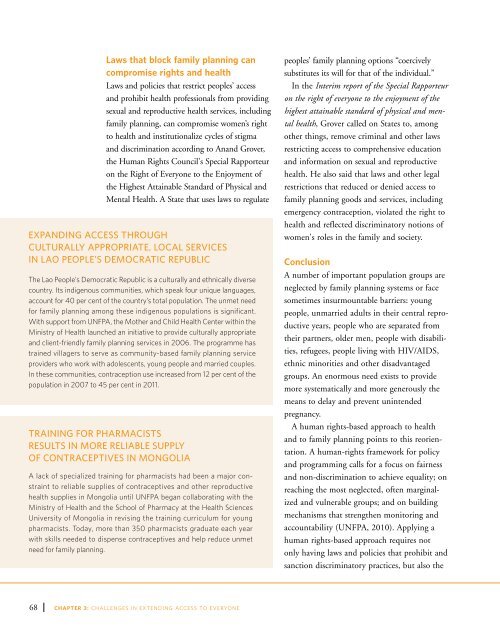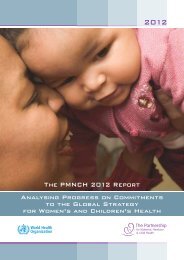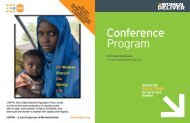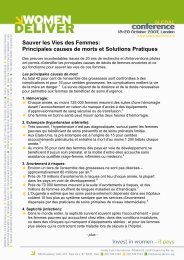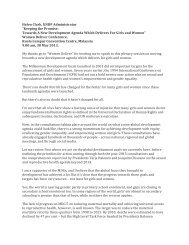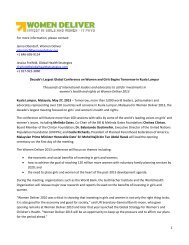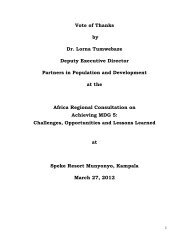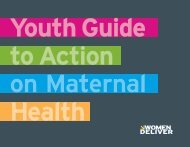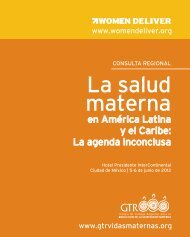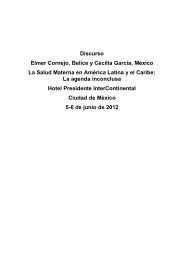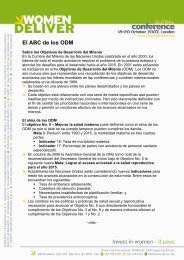State of World Population 2012 - UNFPA Haiti
State of World Population 2012 - UNFPA Haiti
State of World Population 2012 - UNFPA Haiti
Create successful ePaper yourself
Turn your PDF publications into a flip-book with our unique Google optimized e-Paper software.
Laws that block family planning cancompromise rights and healthLaws and policies that restrict peoples’ accessand prohibit health pr<strong>of</strong>essionals from providingsexual and reproductive health services, includingfamily planning, can compromise women’s rightto health and institutionalize cycles <strong>of</strong> stigmaand discrimination according to Anand Grover,the Human Rights Council's Special Rapporteuron the Right <strong>of</strong> Everyone to the Enjoyment <strong>of</strong>the Highest Attainable Standard <strong>of</strong> Physical andMental Health. A <strong>State</strong> that uses laws to regulateExpanding access throughculturally appropriate, local servicesin Lao People’s Democratic RepublicThe Lao People’s Democratic Republic is a culturally and ethnically diversecountry. Its indigenous communities, which speak four unique languages,account for 40 per cent <strong>of</strong> the country’s total population. The unmet needfor family planning among these indigenous populations is significant.With support from <strong>UNFPA</strong>, the Mother and Child Health Center within theMinistry <strong>of</strong> Health launched an initiative to provide culturally appropriateand client-friendly family planning services in 2006. The programme hastrained villagers to serve as community-based family planning serviceproviders who work with adolescents, young people and married couples.In these communities, contraception use increased from 12 per cent <strong>of</strong> thepopulation in 2007 to 45 per cent in 2011.Training for pharmacistsresults in more reliable supply<strong>of</strong> contraceptives in MongoliaA lack <strong>of</strong> specialized training for pharmacists had been a major constraintto reliable supplies <strong>of</strong> contraceptives and other reproductivehealth supplies in Mongolia until <strong>UNFPA</strong> began collaborating with theMinistry <strong>of</strong> Health and the School <strong>of</strong> Pharmacy at the Health SciencesUniversity <strong>of</strong> Mongolia in revising the training curriculum for youngpharmacists. Today, more than 350 pharmacists graduate each yearwith skills needed to dispense contraceptives and help reduce unmetneed for family planning.peoples’ family planning options “coercivelysubstitutes its will for that <strong>of</strong> the individual.”In the Interim report <strong>of</strong> the Special Rapporteuron the right <strong>of</strong> everyone to the enjoyment <strong>of</strong> thehighest attainable standard <strong>of</strong> physical and mentalhealth, Grover called on <strong>State</strong>s to, amongother things, remove criminal and other lawsrestricting access to comprehensive educationand information on sexual and reproductivehealth. He also said that laws and other legalrestrictions that reduced or denied access t<strong>of</strong>amily planning goods and services, includingemergency contraception, violated the right tohealth and reflected discriminatory notions <strong>of</strong>women's roles in the family and society.ConclusionA number <strong>of</strong> important population groups areneglected by family planning systems or facesometimes insurmountable barriers: youngpeople, unmarried adults in their central reproductiveyears, people who are separated fromtheir partners, older men, people with disabilities,refugees, people living with HIV/AIDS,ethnic minorities and other disadvantagedgroups. An enormous need exists to providemore systematically and more generously themeans to delay and prevent unintendedpregnancy.A human rights-based approach to healthand to family planning points to this reorientation.A human-rights framework for policyand programming calls for a focus on fairnessand non-discrimination to achieve equality; onreaching the most neglected, <strong>of</strong>ten marginalizedand vulnerable groups; and on buildingmechanisms that strengthen monitoring andaccountability (<strong>UNFPA</strong>, 2010). Applying ahuman rights-based approach requires notonly having laws and policies that prohibit andsanction discriminatory practices, but also the68 CHAPTER 3: CHALLENGES IN EXTENDING ACCESS TO EVERYONE


